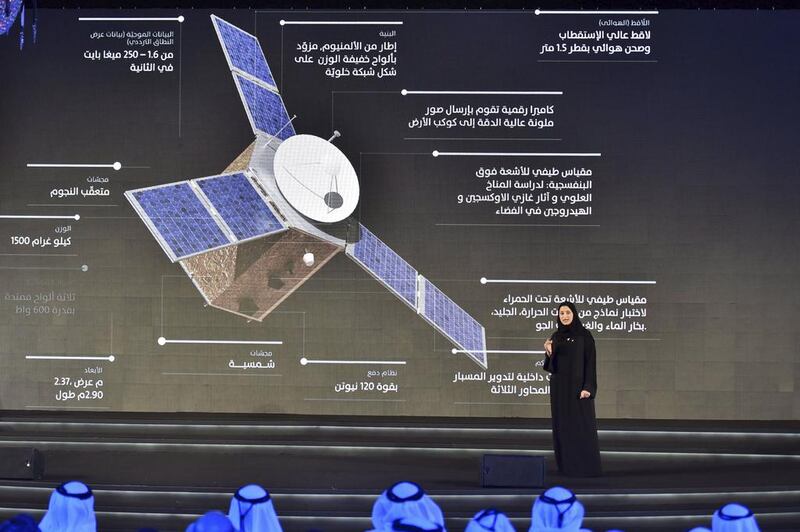ABU DHABI // The Arab world’s first mission to Mars will begin the 62 million kilometre journey to the Red Planet from an island in south Japan.
The UAE's unmanned probe, named Hope, is set to launch from the Tanegashima Space Centre in July 2020 after the UAE Space Agency and the Mohammed bin Rashid Space Centre announced on Tuesday that they would use a Mitsubishi Heavy Industries rocket to send the satellite into orbit.
The Japanese company was chosen from 10 possible launch service providers across the globe after a thorough vetting process, said Salem Al Marri, assistant director-general of scientific and technology affairs at Mohammed bin Rashid Space Centre.
“When we narrowed it down we saw the Japanese were second-to-none in terms of reliability and schedule assurance, which is important as the mission is very time critical, ” said Mr Al Marri.
To realise plans to send the probe to Mars by 2021 so it coincides with the country’s 50th anniversary, the satellite launch must take place during 2020 – one of the biennial launch windows when Earth and Mars are at their closest.
“Procuring a launch is not like buying a ticket on Emirates or Etihad. There are about 50 launches a year, so they are quite a rare occurrence,” said Mr Al Marri.
With a near-perfect record of 29 successful launches from 30 during the last 15 years, the H-IIA rocket model sending Hope on its way has also been selected to launch KhalifaSat – the first satellite built entirely by Emirati engineers – into Earth's orbit by 2018.
Weighing in at 1.5 tonnes, however, the Mars satellite will require a dedicated rocket for the first hour of its seven-month journey to the Martian orbit while the five-times lighter KhalifaSat will be launched in tandem with a Japanese greenhouse gases observing satellite.
By mission’s end, the deep-space probe would have shed more than a few kilos.
“Nearly half of satellite Hope’s weight consists of the fuel required to reach and orbit Mars,” said Mohammed Wali, deputy project manager of the mission’s launch segment at the MBRSC.
The Mars mission announcement was part of a broader declaration of strengthened cooperation between the UAE and Japanese space sectors in the capital on Tuesday.
“Japan has a long history of space science and technology and has accumulated abundant knowledge and experience, an experience that the UAE is interested in exploiting,” said Dr Khalifa Al Romaithi, chairman of the UAE Space Agency.
After signing a memorandum of understanding with Dr Al Romaithi, Dr Naoki Okumura, the president of the Japan Aerospace Exploration Agency, said the agreement would build upon an already well-established relationship between the two countries.
“With our partnership dating back to 2009 we have already established a framework which we will be able now be able to expand on.
“The young generation will be better equipped to contribute to the development of the space sector in the country,” said Dr Okumura.
Dr Mohammed Al Ahbabi, director general of the UAE Space Agency, said the agreement had been years in the making.
“During our meetings with our Japanese counterparts, we discussed opportunities for joint cooperation on various levels, mainly in the field of developing our local capacity and scientific qualifications, which lead us to today’s signing.”
tsubaihi@thenational.ae






